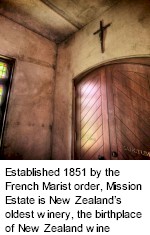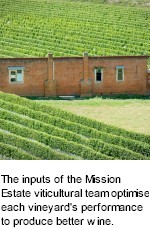


Established 1851 by the French Marist religious order, Mission Estate are New Zealand's oldest winemaking concern under continuous management. A Mission of French clergy sailed to New Zealand in 1838 with little more than their faith and a few vines. The Society of Mary was founded near Lyon in France. With the blessing of the Pope, a group travelled to the Pacific, arriving in New Zealand in 1838. Besides being a teaching order, the Fathers established a mission station near the Ngaruroro River between Napier and Hastings at Pakowhai. They followed the tradition of running a balanced farm property, fruit trees, cattle, and a vineyard.

In 1858, the missionaries moved to land they had purchased at Meeanee and a major community was established. A cottage for living quarters was transported from Pakowhai and later a Church, school and study halls were built. Vines were planted to produce both sacramental and table wine for their wine-drinking tradition. The first record of a commercial sale dates back to 1870 when a parcel of mostly dry reds was sold. The Cellar Master at the time was Brother Cyprian Huchet, who retained this position until 1899 and is considered the pioneering winemaker of New Zealand.
Mission Estate own and operate three vineyard sites within Hawke's Bay, each of which has its unique characteristics that are suited to different grape varieties and resulting wine styles. Greenmeadows at Taradale, the Mere and Gimblett Road vineyards on the eminant Gimblett Gravels.
Mission Estate retain a magnificent 100 hectare vineyard in the Awatere Valley of Marlborough. Grapes are also sourced from Hawkes Bay's finest growers. Moteo Pa and Ohiti Road, Middle Road and Ngatarawa Triangle. The inputs of the viticultural team optimise each vineyard's performance to produce better wine.

Sustainable winegrowing is an environmental management system employed to ensure the protection of land and environment. It is Mission Estate's belief that protecting and managing vineyards and environment in a sustainable way is an inseparable part of viticulture, to ensure longevity of healthy fruit production. In addition, contract growers must also manage their sites sustainably to supply Mission Estate. Precision Viticulture identifies the variation in the vineyards (soil and vine growth) using different sensors that are linked to GPS. This enables the Mission Estate team to produce maps of which highlight areas of significant difference. These differences impact on fruit attributes such as ripeness, yield and overall quality. As a result, this makes it possible to selectively harvest areas of the vineyard so that each parcel ripens to the targeted requirement.
Mission Estate is New Zealand's oldest winery and the birthplace of New Zealand wine. While their wines are crafted using the latest in technology, they also employ many traditional winemaking techniques handed down from their early French winemaking pioneers. Mission Estate has consistently produced wine sustainably, the philosophy is to minimise additions so that their wines show true regional and varietal expression.
